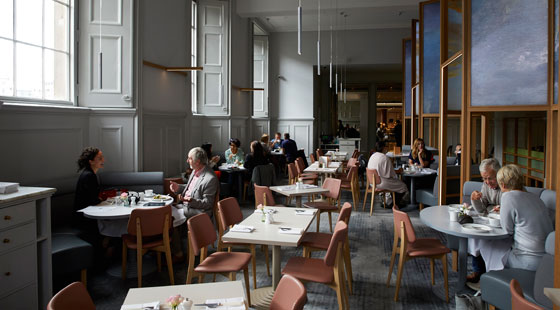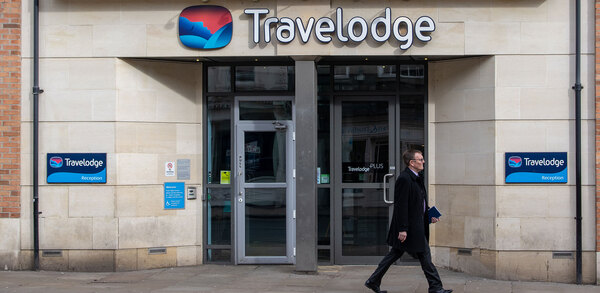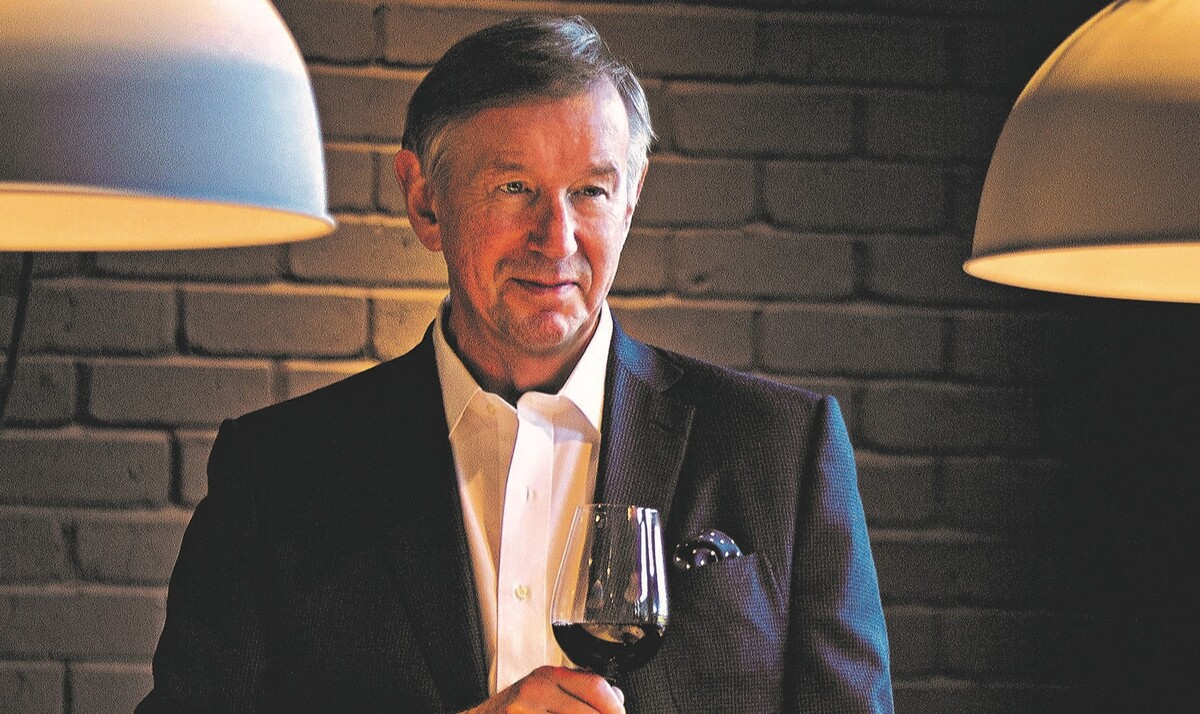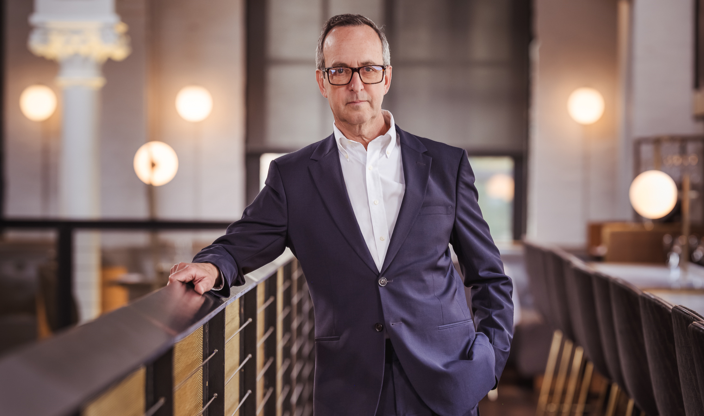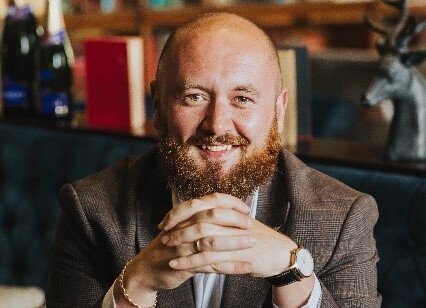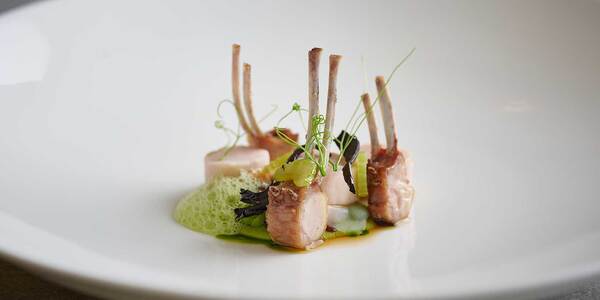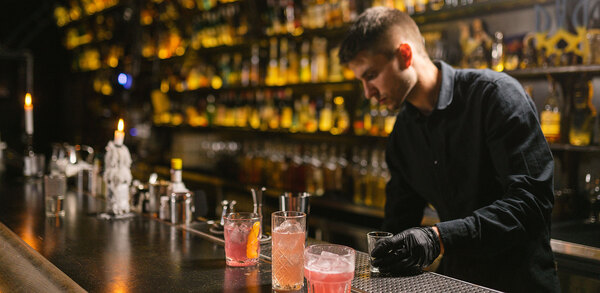Peyton and Byrne and Sodexo – an unlikely pairing
A year after global foodservice giant Sodexo rescued niche London caterer Peyton and Byrne from administration, Sodexo chief executive Chris Bray explains why the two very different operators are better together. James Stagg and Rosalind Mullen report
When the sports and leisure arm of Sodexo waded in to rescue boutique caterer Peyton and Byrne from administration last October, it seemed an unlikely pairing. It also seemed possible that the London-based brand would be cannibalised by its new owner. But a year on, the brand remains intact and both sides believe it optimises business to keep it that way.
"It's easy to be cynical when a big company buys a small company, but it is a great opportunity for both of our businesses," says Chris Bray, the chief executive of Sodexo's sports and leisure division.
Managerially, little has changed. The upmarket Peyton and Byrne brand was founded by sibling restaurateurs Oliver and Siobhan Peyton (pictured flanking Bray) in 2005 and both have moved over to Sodexo. Oliver remains creative director and Siobhan managing director. "I can't ‘Sodexify' them as they are successful for a reason. We need to maintain the integrity of the brand and retain the Peyton and Byrne essence," stresses Bray.
Like many small businesses, Peyton and Byrne was finding compliance and financial issues a burden. But all that is now behind them, as Siobhan explains: âHaving the infrastructure to meet standards was challenging. Sodexo is great to support us. It opens doors. We can go into a client and say we have all the HR and infrastructure and health and safety ticked off, and we have great financial support through Sodexo, while we bring the creativity. So we have a great package, in my view.â
Sodexoâs sports and leisure division caters at a number of attractions and sports venues in the UK, and its acquisition of Peyton and Byrneâs public contracts and events business represents a canny move into the boutique market. Not only has it retained the Peytonsâ creative expertise, it has also gained its remaining public catering contracts with the National Gallery, the Royal Academy of Arts, the Imperial War Museum, the ICA and the Wallace Collection. And while the Peytons run the five bakery cafés across the capital separately under a new company, Peyton and Byrne Bakeries, there is scope for collaboration.
Bray says: âThe company has three parts we are attracted to: public catering with five prestigious contracts in iconic London venues, which can help us showcase the best of what we do; Peyton Events in 18 venues in London, which fits in with us and gives us scale on the boutique side; and the bakeries, which have stayed with the family but we have agreed with them that we will try to integrate them into our business. There is a big opportunity across all our segments for us to grow together.â
a relative newcomer to sports and leisure. Oliver, on the other hand, has a public profile as a judge on BBC2âs Great British Menu, and he and Siobhan are entrepreneurs who have launched several headline-grabbing concepts on the high street in the past three decades, including Atlantic Bar & Grill, Mash & Air, and Coast.
The family angle
But there are also similarities. For instance, both businesses are family-owned. Director Nathalie Bellon-Szabo, daughter of Sodexo founder Pierre Bellon, met the Peytons to make sure the fit was right.
Bray explains: âNathalie and I spent time with Oliver and Siobhan, so we all knew what we were getting into and we agreed and aligned. Oliver and Siobhan were clear that the essence of Peyton and Byrne was important to the clients they had and that they needed it to retain them. So we spent time with their clients too, explaining what we wanted to do.
âIt was not a snap decision. It fits in with what we want to achieve and we will work with them to help them grow. Itâs important that we donât take away the âsoulâ of Peyton and Byrne and dilute its independent spirit.â
âThey are receptive to what Peyton and Byrne stand for,â Siobhan confirms. âTheir directive from day one was: donât mess with the brand.â This was crucial. Not least because the contracts at the time allowed clients to opt out following a change of ownership.
Sodexo has made clear it will not only keep the brand intact, but invest to improve it. In March, it relaunched one of Peyton and Byrneâs flagship contracts, the National Galleryâs National Dining Rooms, following a refurbishment by Paris-based Belgian designer Ramy Fischler. The works, which took two months, involved a full refit of the restaurant, the Trafalgar Room, and the grab-and-go area, providing new creative potential for events.
There are still six years to run on the contract, which after a nine-year tenure was extended for a further eight years in 2015 in a deal worth an estimated £36m. Bray says: âThe worst thing we could do was turn it into one of our venues. This gallery is a beautiful space. We have taken it up a notch and can use it to take the business forward.â
Bray admires the Peytonsâ ability to make their spaces destinations in their own right, attracting not just gallery-goers, but diners, especially in the evenings when the gallery is closed.
âEvening trade is important to us and a crucial aspect of what they do,â he says. âWe are good at delivering in spaces, and Peyton and Byrne is good at making the most of them.â
Of course, Sodexoâs UK sports and leisure business manages contracts across a broader spectrum than just galleries. Its diverse portfolio embraces Bateaux London and more than 45 venues, stadiums and events, including the Chelsea Flower Show, Ascot Racecourse, Henley Royal Regatta, the British Open, Hampden Park, Everton FC, Newcastle United FC and Dundas Castle.
Bray says he envisages several areas where Peyton and Byrne could slip neatly into Sodexoâs wider business. For example, he launched a Peyton and Byrne pop- up at Chelsea Flower Show this summer and adds that Peyton Events will benefit from enquiries generated through Sodexoâs large database.
âPeople worry about where we are going with Peyton and Byrne,â he acknowledges. âChelsea Flower Show was a big statement in that respect. Peyton and Byrne is a great public-facing brand. It was the first time we had moved it into one of our businesses and the clients were supportive.â
Bray is also leveraging Oliverâs profile and creative talent: âHe is working with us on projects in other areas, and with Bateaux London to enhance it and take it forward.â
Certainly, Peyton and Byrneâs brand visibility in London is important to Sodexo. It has, after all, worked well for foodservice operators such as Baxterstorey, which took over highstreet brand Benugo in 2008. âWe are good at events, from small to large,but this high-end events piece was missing from our business. Peyton and Byrne has plugged a gap to get us into this boutique side,â says Bray. âWe do mass catering really well, and this acquisition has given us the opportunity to grow much quicker, especially in the London market. We can pitch for the business we couldnât pitch for before.â
In short, both sides complement each other. âThe creativity and agility of Peyton and Byrne is important to me,â says Bray. âAnd at Sodexo, we have the engine room â" that whole backoffice and infrastructure system â" to help them to do what they do best.â
Brand integrity
Even so, Sodexo hasnât imposed too many economies of scale. For instance, although Sodexo bought specialist procurement company PSL last October, Bray recognises the key to Peyton and Byrneâs brand integrity is that it uses artisan suppliers.
âIf we try to change that by bringing in big commodity products, it wouldnât work,â he says. âWe have retained their artisan suppliers, but where there are synergies on bulk products, we bring PSL in.â
Peyton and Byrneâs 440 employees came with the acquisition and have been integrated into Sodexo. âWhat we do well is train and promote from within, so our retention is strong,â says Bray. âWe have fantastic people in our business. They will benefit from Oliver and Siobhan, and the other way round.â
Bray acknowledges that Sodexoâs acquisition of the business was a big change for clients too, but he underlines Sodexoâs long-term commitment. âThe clients have been with Peyton and Byrne for some time and they have a good relationship,â he says. âAnd our client retention rate last year was 100%, so once we get contracts, we go for the longer term. Having the ownership strategy that we do â" a family-owned majority share â" helps us, as we are not so reactive to the markets and can invest in longer-term contracts.â
He cites the contract at Aberdeen FC, which has been running for 23 years and has recently been extended for a further three years, in a deal worth £5.7m. For a niche brand such as Peyton and Byrne, the opportunities must now seem endless. Siobhan says: âWe are entrepreneurial; we want to grow and to add value outside of sport and leisure as well. It is brilliant to have Sodexo behind us.
People were worried about the change, but I have remained close to the business and nothing has changed except now people are seeing the opportunity. Infrastructure came into play very quickly. There has been an element of âwait and seeâ, but our clients see that nothing has changed.â
Elsewhere in the world of Sodexo sports and leisureâ¦
Other parts of Sodexoâs UK sports and leisure business are busy too. As well as extending the Aberdeen FC deal for three years, Bray has just extended the £20m contract at Hamilton Park racecourse near Glasgow for 10 years. He says Sodexo is always cross-fertilising initiatives from its stadium contracts in the US and France.
âIn the US, there are different levels of hospitality. They are off the scale â" from casual to $25 burgers â" and we can learn from that,â he says. US stadium contracts also tend to rely more on technology, with fans downloading apps and ordering drinks and snacks to be delivered to their seats.
âAmerican football runs all day,â Bray says. âTechnology and apps work well there because we have time to get orders to the seat. Here, you canât walk in front of people.â
Nevertheless, he says that catering at UK stadiums is changing. âThe pre-order journey will improve. We aim to attract fans before they get into the stadium â" being aware of who the fan is and where they go and what they purchase. It is an opportunity to know what the season ticket-holder drinks.â
He also points out that VIP hospitality areas used to be formal places where guests wore a suit and tie and watched the game from behind glass, but that people today want to be linked with the experience.
Sodexo installed a two-tier pavilion at Twickenham for the 2015 Rugby World Cup, with a seated fine-dining area at the top and a more informal offer at the bottom. Bray says that many from the top came down to the bottom in order to experience the atmosphere.
He adds: âWe are doing work at Hampden Park at the moment, where they are prepping for the 2020 European Championships. The glass panels in the boxes have been removed to get fans involved and to be part of it. The secret is getting people closer to the action â" being part of the atmosphere.


